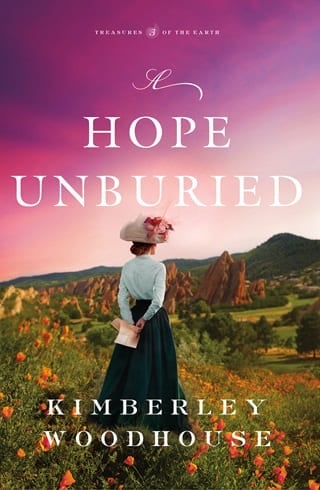Chapter 18
eighteen
"The country is beautiful now as everything except the exposed rocks is covered with verdue. There are many flowers in bloom. I wish I knew the names of them, but I know but few."
~Earl Douglass
T HURSDAY , A UGUST 10, 1916 · C ARNEGIE I NSTITUTE
He had often wondered what utter victory tasted like. Today, it tasted like the rare whiskey at his club, rich and smooth on his tongue. The amber liquid warmed him from the inside out.
Had he ever felt so happy? Not that he could recall.
Turner and Lincoln had done their jobs exceptionally well. Better than he anticipated. Eliza Mills was the laughingstock of the scientific world. The moment was ripe for him to step into the spotlight and let his peers and leaders see just how vast his knowledge and expertise were. And just how indebted they were to him for his brilliant, forward-thinking mind.
He would now become Carnegie's most valuable asset. And he could hardly wait to let the world know exactly that. Finishing his whiskey, he stood and strode out of the club. Scanning the street, he spotted a five-cent jitney car sitting down the street.
Placing his fingers between his lips, he let loose a whistle, high and sharp.
The driver looked up and gave him a nod, driving his black automobile up to the edge of the sidewalk. The balding man poked his head out the window. "Where to, sir?"
"The Pittsburgh Post-Gazette ." He opened the back door.
The man whistled. "That's clear on the northwest side of town."
He settled in the back seat and glared at the older gentleman. "I'll pay you double if you can get me there in twenty minutes."
Bushy white eyebrows shot up on the driver's wrinkled forehead. "Yes, sir!"
Eighteen minutes later, he was walking up the front steps of the newspaper building. Pushing through the large doors, he entered a room of chaos. Typewriters clacked loudly, cigar smoke hanging in the air.
A young man with slicked-back hair and wire-rimmed glasses nodded from the desk at the front of the room. "What do you want, sir?"
He adjusted his tie and approached the large oak desk. "I need to speak with someone about a scoop of a story with the Carnegie Museum and Mr. Carnegie himself."
The young man gazed at him, dark brown eyes large and unblinking behind his thick glasses. "And who are you?"
"I am a leading scientist at the Carnegie Museum. Here is my card." He slid the rectangular paper across the smooth surface of the desk. "Trust me when I say one of your writers will want the scoop of the year regarding the Dinosaur National Monument, the Carnegie Institute, and skeletons. In the closet and otherwise."
He smirked. Such a clever turn of phrase. He was in rare form today.
"Hmm..." The clerk took his card and studied it for a moment.
Oh yes, the interest was there. His pulse thrummed. His rightful recognition was almost in his grasp.
Finally, the wiry young man pushed back from his desk and entered the frenzy of reporters behind him. He walked to a desk in the far-right corner and whispered something in the ear of a man who looked to be about forty, with sandy brown hair and a serious expression.
The two men walked back toward him. The clerk pushed the swinging gate open for the writer with him.
"This is Bradley Hopper. He is our national news writer and has covered many events out at the museum."
"A pleasure to meet you, Mr. Hopper. Might I take you out for a cup of coffee? I promise an afternoon with me will not be wasted. The story I have for you is a scoop to capitalize on the dinosaur mania sweeping our fair country."
"There's a small deli about four blocks from here." Mr. Hopper motioned toward the door. "A good spot to discuss your ... scoop."
So. The writer was skeptical. Not to worry. By the end of the afternoon, and on the heels of a generous tip for running his story, the article would be queued up for the paper's run the next day.
The next morning, he stepped out of his boardinghouse, a bounce in his step and humming a jaunty tune. The stories couldn't have been better. He pulled the newspaper from under his arm and snapped it to its full length.
Carnegie Museum Scientist Is Real Genius behind Dinosaur National Monument
Female Paleontologist Steals from Museum
They were beautiful. Mr. Hopper had outdone himself. The articles were perfect. In fact, he had almost memorized them both in their entirety. But his favorite paragraph was the one outlining his spectacular accomplishments in discovering Carnegie's beloved Dippy, his direction to Earl Douglass to dig just a bit farther to the northwest of the quarry, and his prestigious post as the Carnegie Museum's curator.
As curator, Mr. Nelson has brought several popular displays to the Carnegie Institute. Responsible for the discovery of Diplodocus carnegii , fondly known as Dippy, Mr. Nelson launched Andrew Carnegie's dream of paleontological science into the stratosphere. Not only is his Diplodocus carnegii beloved by kings and world rulers alike, it is the cornerstone for the magnificent Hall of Dinosaurs. Conceived by Mr. Nelson's keen oversight and care, the Hall of Dinosaurs is the number-one attraction at the museum. And he only plans to make it bigger and better.
"I am determined to make Carnegie Institute the crown jewel of paleontology," he told this reporter. "And with the discoveries from the Dinosaur National Monument, we will have species of dinosaurs to display for decades to come. I am sure Earl Douglass thanks his lucky stars every day when he remembers it was I who encouraged him to dig just a few hundred yards farther to the northwest in what is now Dinosaur National Monument."
Mr. Hopper had eaten every detail right out of his hand. Nelson almost crowed. It was he who had single-handedly changed the face of paleontological science in America. That little Miss Mills was painted as a thief. She'd never work in the field again.
Job offers would start pouring in, giving him leverage with Carnegie to force the man to pay him what he was actually worth.
He would bring more fame and honor to Carnegie than Douglass could ever have dreamed of doing. First, he would drain Carnegie Quarry of every last bone and fossil, ensuring the museum's displays would not only be the largest in the world, but would have his name on each one.
Then they would move all dig operations to Montana and capitalize on several quarries producing various fossils in the Badlands. And from there, who knew what heights he could reach?
Finally, everything was going his way.
F RIDAY , A UGUST 11, 1916 · C ARNEGIE I NSTITUTE
Mr. Andrew Carnegie sat behind his massive desk and looked up at Devin over the rim of his spectacles. "Thank you, young man."
"You're welcome, sir."
"Had you not come to me about the rumors that were going around, I would have learned about this debacle far too late." He lifted the morning's paper and shook his head. "Mr. Nelson would have covered his tracks, I'm sure. And I would have lost the best preparator and authenticator I've ever had." The older man leaned back in his chair.
"All thanks to one of the secretaries at the museum, sir. Sarah called me because she knew Eliza wasn't guilty. You should thank her as well." Devin stood as straight as he could. This was the second time he'd been in Mr. Carnegie's office, and he still couldn't believe he was here.
Never had he been in the presence of anyone who had so much wealth, nor anyone who'd given so much wealth away. Other than Eliza's family. It was truly impressive.
Carnegie removed his spectacles and smiled at him. "I will make sure to thank Sarah as well as soon as I've dealt"—he poked the paper with his index finger—"with this."
"Thank you, sir."
"Are you sure you won't sit and have lunch with me? I'd love to hear about your work in the English department and your many years of friendship with Eliza."
"As wonderful of an offer as that is, sir, I'd like to get to the train station as soon as possible." Devin glanced at the massive grandfather clock in the corner of the room. If he could finish with Mr. Carnegie in twenty minutes, he'd make the afternoon train with a few minutes to spare.
Carnegie quirked one eyebrow. "Headed west?"
"Yes, sir."
"To a quarry in Utah, might I presume?"
"Yes, sir." Devin tried not to chuckle, but it came out anyway. "Might I ask a favor before I go?"
"Fire away."
"Might I use your telephone? The sheriff in Jensen sent me a telegram asking me to call, and I haven't been able to get through."
"Go right ahead." Mr. Carnegie turned the phone toward him. "And if you or Eliza need my assistance in any way, I'm ready to help."
"Thank you, sir." Devin didn't waste any time putting in the call with the operator. This was the part that took a while, if the call could make all the connections. When the sheriff answered, Devin breathed a sigh. "Sheriff, this is Devin Schmitt. I received your telegram."
As the man gave him the rundown, Devin nodded and lifted his shoulders. "I'll be on the next train, sir."
S ATURDAY , A UGUST 12, 1916 · J ENSEN
That female paleontologist was ruining everything again.
She'd probably found the painted rock, her special marker, and took it. Made it part of her silly fossil collection.
All it did was make finding her box of gold much more difficult.
To make things worse, that woman was back at the ranch digging for fossils again. Why hadn't all that stopped when Lucas Meyer was arrested? Most of the workers had left—it had been perfect.
She should have been able to get out there and follow the map in peace. As it was, it would probably take her a good week to find it all, dig it up, and cart it off.
Now Miss Mills's presence was delaying that even more.
But what could she do?
She paced the hallway and chewed on her thumbnail.
After several passes, the only solution stared her straight in the face.
She'd have to do it.
It was the only way she could leave with the gold. She wasn't about to give up now.
What was one more death to achieve her dream?
M ONDAY , A UGUST 14, 1916 · D INOSA UR N ATIONAL M ONUMENT
Finally. The quarry was open to visitors again, one day a week.
Eliza was excited to get back out there and speak to people. Much easier out there at the monument, which people really wanted to see. And if anyone asked her about the newspaper article and the papers she wrote, God would help her handle it. As He'd helped her when a man in town stopped her at the hardware store to point out that scientists were always arguing with one another so why should anyone believe them?
His logic pained her.
She'd worked with other paleontologists for years. Yes, she disagreed with several of them on different issues. But they'd all agreed to disagree and focus on the work.
However ... now that she thought about it, her family's wealth was well known. As was the fact that their money often funded whatever dig she'd been on.
Could that have kept people from saying anything negative in front of her until the chaos this summer? Had someone been jealous of her and over the years formed a plan against her?
She hated to even think it, but that was the way of the world, wasn't it?
It was a wonder Mr. Carnegie had believed in her like he did.
With a deep breath and a prayer for wisdom and strength, she went to the visitor tent.
Time to put on her best smile and welcome them.
"Good morning." She prayed no one would be divisive or argumentative. But as the group moved toward her, she noticed there were two young girls present. Dressed in their finest, even in the hot landscape of the quarry. Their eyes sparkled.
Now there was a look she knew well. Eagerness to learn.
A fresh wave of energy rushed through her.
It didn't matter what mean-minded people said, there were so many others passionate to discover the truth. And if she could point some to the Creator, that's what it was all about, right?
She motioned the two young girls forward and gave them each a fossil to hold.
Mesmerized, the girls stared, eyes glowing.
Smiles lit the adults' faces.
"Thank you for coming out to Carnegie's quarry at Dinosaur National Monument. Who's ready to talk about dinosaurs?"
W EDNESDAY , A UGUST 16, 1916 · M EYER R ANCH
"Miss Mills?"
Eliza started. The young kid from the telegraph office was beside her.
Wow, she must have really been focused on the fossil she'd been attempting to pull from the rock for the last hour. She hadn't even heard him approach. "Good morning." She smiled and got to her feet.
"I've got another telegram for you. Mr. Clarence wanted me to apologize. It should have been delivered a while back. Somehow it fell behind the counter."
"Oh, thank you for bringing it to me." She took it and smiled at him, handing him a coin. Hopefully it wasn't anything of great consequence.
He rushed off without another word.
Eliza slid her finger under the flap of the envelope and pulled out the sheet of paper. Dated more than ten days ago.
Someone spreading rumors. Accused you of stealing fossils and donor money. Called Mr. Schmitt for help. Sarah
What!? Who would do such a thing? Sweat broke out across her back, making her shirt stick to her. Where was a cool breeze when she needed one? Fanning herself with the envelope and paper, she tried to calm her breathing. What did Mr. Carnegie think? Would he believe it? She hadn't heard anything from him in a while. Her stomach plummeted. Oh, this was terrible. And she wasn't even there to defend herself? What was she supposed to do?
Taking a deep breath, she paced. She had to think this through.
What were her options?
If she rushed back, would they believe her? Or would trying to defend herself simply make them think she was more guilty? Especially in light of the horrible article by the imposter. Would that previous article make people assume she was guilty?
A woman in this day and age didn't exactly have the same clout as a man. No matter what her last name was.
At least Sarah had called Devin. She hated dragging him into something else, but he would defend her. In her heart, she knew he would. But he hadn't said a word about it either. Why?
She tapped the envelope against her hand as she continued to stomp her frustrations out into the desert-like terrain.
Deborah had gone off in search of the outhouse near the cattle shed, which meant Eliza could growl out her frustrations to the sky without being heard.
She marched through the grass, mumbling under her breath. There had to be something— any thing—she could do.
But Pittsburgh was a world away.
She had no idea who her accuser was.
And she had no control. No idea what was happening. No solution whatsoever.
Wadding up the telegram, she released a scream to the sky. When that didn't help, she stomped around some more. Why, God? Why?
Eliza buried her face in her hands, trying to stem the tears. Again. But an ominous click made her freeze in her tracks.
Was that... a gun?
"Turn around slowly, Miss Mills, and your friend won't get hurt."
 Fullepub
Fullepub 



